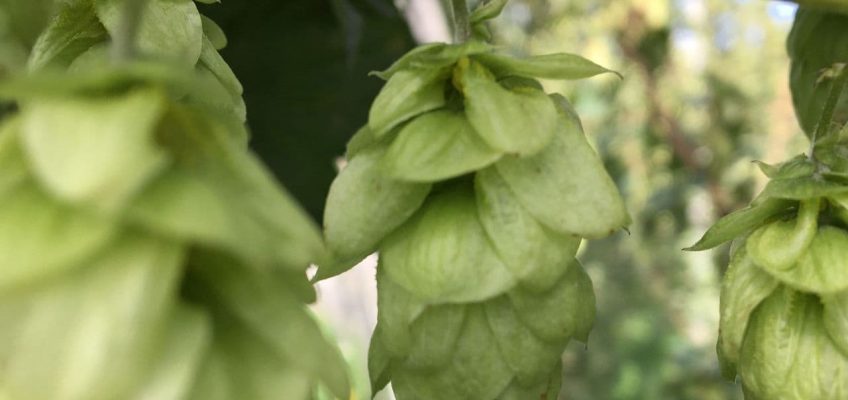The UK has a rich brewing tradition, and at the heart of every pint is a humble yet vital ingredient-hops.
British hops are a vital component of the UK’s brewing heritage, with their cultivation deeply rooted in the country’s agricultural practices. Primarily grown in the counties of Kent, Herefordshire, and Worcestershire, these hops thrive in the unique terroir of the British countryside.
Hops are the flowering cones of the hop plant, and they bring bitterness, flavour, and aroma to beer. It’s the hops that give each beer its distinctive character, balancing sweetness with a unique, complex taste.
Hops are primarily grown in two main regions, the South-East counties (Kent, Suffolk, Surrey, Sussex) and the West Midlands counties (Herefordshire, Worcestershire) .
Kent: The Beer Garden of England
Kent, in the South East of England, is often referred to as the “Garden of England” and is renowned for its hop production. The county’s unique climate and soil conditions make it ideal for growing a variety of hop types, from the delicate and floral East Kent Goldings to the spicy and earthy Fuggles. Suffolk, Surrey, Sussex are also home to hop farms producing annual harvests.
East Kent Goldings, one of the oldest hop varieties still in production today, is known for its smooth, refined bitterness and a light, honey-like aroma. It’s a favourite among brewers for traditional English ales. The local terroir-comprising the soil, climate, and cultivation techniques, imparts a distinct character to British hops that is hard to replicate elsewhere.
West Midlands: A Tradition of Excellence
The West Midlands, including the counties of Herefordshire and Worcestershire, is another significant hop-growing region in the UK. Herefordshire, in particular, has a long history of hop farming, dating back to the 16th century. The region’s rich, fertile soil and mild climate provide ideal conditions for growing hops like Challenger and Bramling Cross.
Together, these two regions—South East England and the West Midlands—produce around 80% of the UK’s hops, contributing significantly to the country’s brewing heritage.
Why Are Hops So Important in Beer?
Hops are an essential ingredient and play several roles in beer-making:
British Hops: What Makes Them Unique?
British hops are known for their subtler, more delicate profiles compared to their American or European counterparts. They tend to have earthy, woody, floral, and slightly spicy notes. This makes them ideal for traditional English styles like bitters, milds, porters, and stouts.
While American hops often have bold, citrusy, and fruity flavours, British hops offer a more nuanced, subtle, and traditional flavour profile. They provide the backbone for classic beer styles that focus on balance and drinkability, rather than intense hop-forward flavours.
Hop Varieties to Know and Love
Here are some of the most popular hop varieties grown in the UK:
These varieties are highly regarded for their ability to bring balance and complexity to beer, making them favourites among brewers.
When is Hop Harvest?
Hop harvest in the UK typically takes place from late August to early September. This is when the cones reach their peak of ripeness, filled with essential oils that give hops their distinctive flavour and aroma. During harvest, the air in hop-growing regions is filled with the rich, pungent scent of fresh hops – a sign that brewing season is just around the corner.
The harvested hops are quickly dried and processed to preserve their delicate flavours and aromas.
Hop Pickers Holiday
Hop picking in Kent was once a cherished tradition for generations. Every year, families, primarily from London, would travel to the hop fields for the harvest season, becoming an annual pilgrimage. For many, hop picking was not just a job but a holiday, offering a break from normal life and a chance to enjoy the countryside. From the 1950s, as times changed, the tradition began to decline.
However, events like the Faversham Hop Festival, which takes place on Saturday, August 30th and Sunday, August 31st, 2025, continue to celebrate this rich heritage, ensuring that the legacy of hop picking remains an integral part of Kent’s cultural identity.
Hop Farms to Visit in the UK
If you’re a beer enthusiast, visiting a hop farm is a fantastic way to learn more about this essential ingredient. Some hop farms offer guided tours and tastings, giving you a chance to see the growing process up close. You can walk through the farm, see the hops being harvested, and sample beers made with the local hops.
Support Local: Choosing British Hops for Your Beer
By choosing beers brewed with British hops, you’re supporting local farmers and helping to preserve a vital part of the UK’s agricultural landscape. The hop industry supports hundreds of jobs in rural areas and keeps alive skills that have been passed down through generations.
Whether you’re a home brewer, a craft beer lover, or someone who simply enjoys a pint down at the pub, consider seeking out beers made with British hops. You’ll be enjoying a drink crafted with care and pride.
So, the next time you raise a glass, think about the journey those hops have taken-from the fields of Kent or Herefordshire to your pint glass. Cheers to British hops, the unsung heroes of every great beer!







